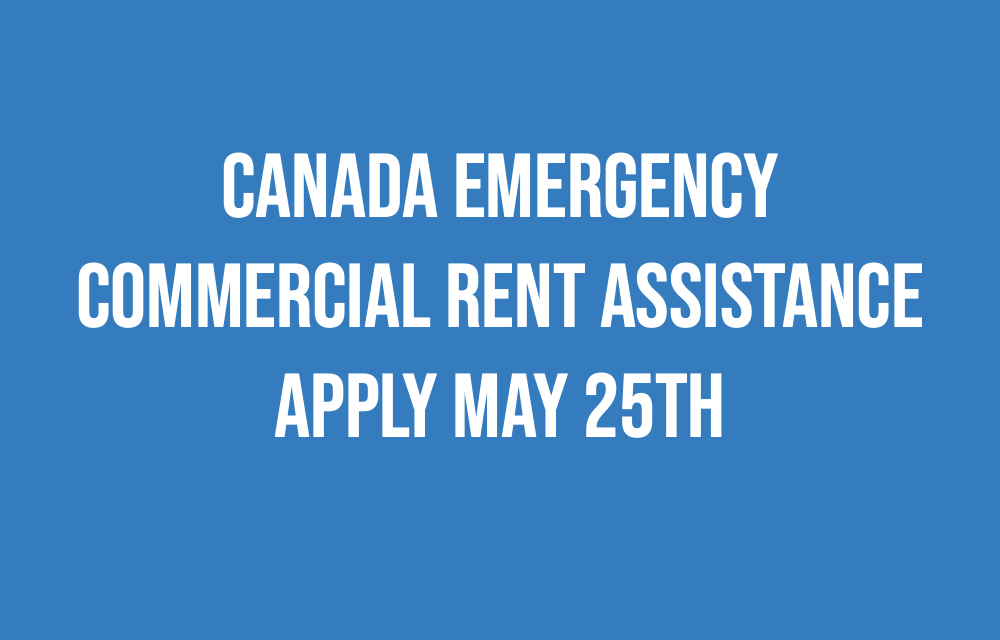Lower rent by 75% for small businesses that have been affected by COVID-19
The Application portal for the Canada Emergency Commercial Rent Assistance (CECRA) opens at 8:00am EST on May 25th. The description from the CMHC website:
“Canada Emergency Commercial Rent Assistance (CECRA) for small businesses provides relief for small businesses experiencing financial hardship due to COVID-19. It offers unsecured, forgivable loans to eligible commercial property owners to:
reduce the rent owed by their impacted small business tenants
meet operating expenses on commercial properties
Property owners must offer a minimum of a 75% rent reduction for the months of April, May and June 2020.”
Application Dates
Due to expected high volumes of applications, the application dates will be as follows:
-
Monday – Property owners who are located in Atlantic Canada, BC, Alberta and Quebec, with up to 10 tenants who are eligible for the program
-
Tuesday – Property owners who are located in Manitoba, Saskatchewan, Ontario and the Territories, with up to 10 tenants who are eligible for the program
-
Wednesday – All other property owners in Manitoba, Saskatchewan, Ontario and the Territories
-
Thursday – All other property owners in Atlantic Canada, BC, Alberta and Quebec
-
Friday – All
Eligibility
From the CMHC website:
“To qualify for CECRA for small businesses, the commercial property owner must:
-
own commercial real property* which is occupied by one or more impacted small business tenants
-
enter (or have already entered) into a legally binding rent reduction agreement for the period of April, May and June 2020, reducing an impacted small business tenant’s rent by at least 75%
-
ensure the rent reduction agreement with each impacted tenant includes:
-
-
a moratorium on eviction for the period during which the property owner agrees to apply the loan proceeds, and
-
a declaration of rental revenue included in the attestation
-
The commercial property owner is not and is not controlled by an individual holding federal or provincial political office.
CECRA will not apply to any federal-, provincial-, or municipal-owned properties, where the government is the landlord of the small business tenant.
Exceptions
-
Where there is a long-term lease to a First Nation, or Indigenous organization or government, the First Nation or Indigenous organization or government is eligible for CECRA for small businesses as a property owner.
-
Where there are long-term commercial leases with third parties to operate the property (for example, airports), the third party is eligible as the property owner.
-
Also eligible are post-secondary institutions, hospitals, and pension funds, as well as crown corporations with limited appropriations designated as eligible under CECRA for small businesses.
NOTE: Small businesses that opened on or after March 1, 2020 are not eligible.
* We define commercial Real Property as a commercial property with small business tenants. Commercial properties with a residential component and multi-unit residential mixed-use properties would equally be eligible with respect to their small business tenants.
NOTE: Properties with or without a mortgage are eligible under CECRA for small businesses.
What is an impacted small business tenant?
Impacted small business tenants are businesses — including non-profit and charitable organizations — that:
-
pay no more than $50,000 in monthly gross rent per location (as defined by a valid and enforceable lease agreement)
-
generate no more than $20 million in gross annual revenues, calculated on a consolidated basis (at the ultimate parent level)
-
have experienced at least a 70% decline in pre-COVID-19 revenues **
NOTE: Eligible small business tenants who are in sub-tenancy arrangements are also eligible, if these lease structures meet program criteria.
** Small businesses can compare revenues in April, May and June of 2020 to that of the same period in 2019 to measure revenue losses. They can also use an average of their revenues earned in January and February of 2020.“
For Full Details and to apply:

